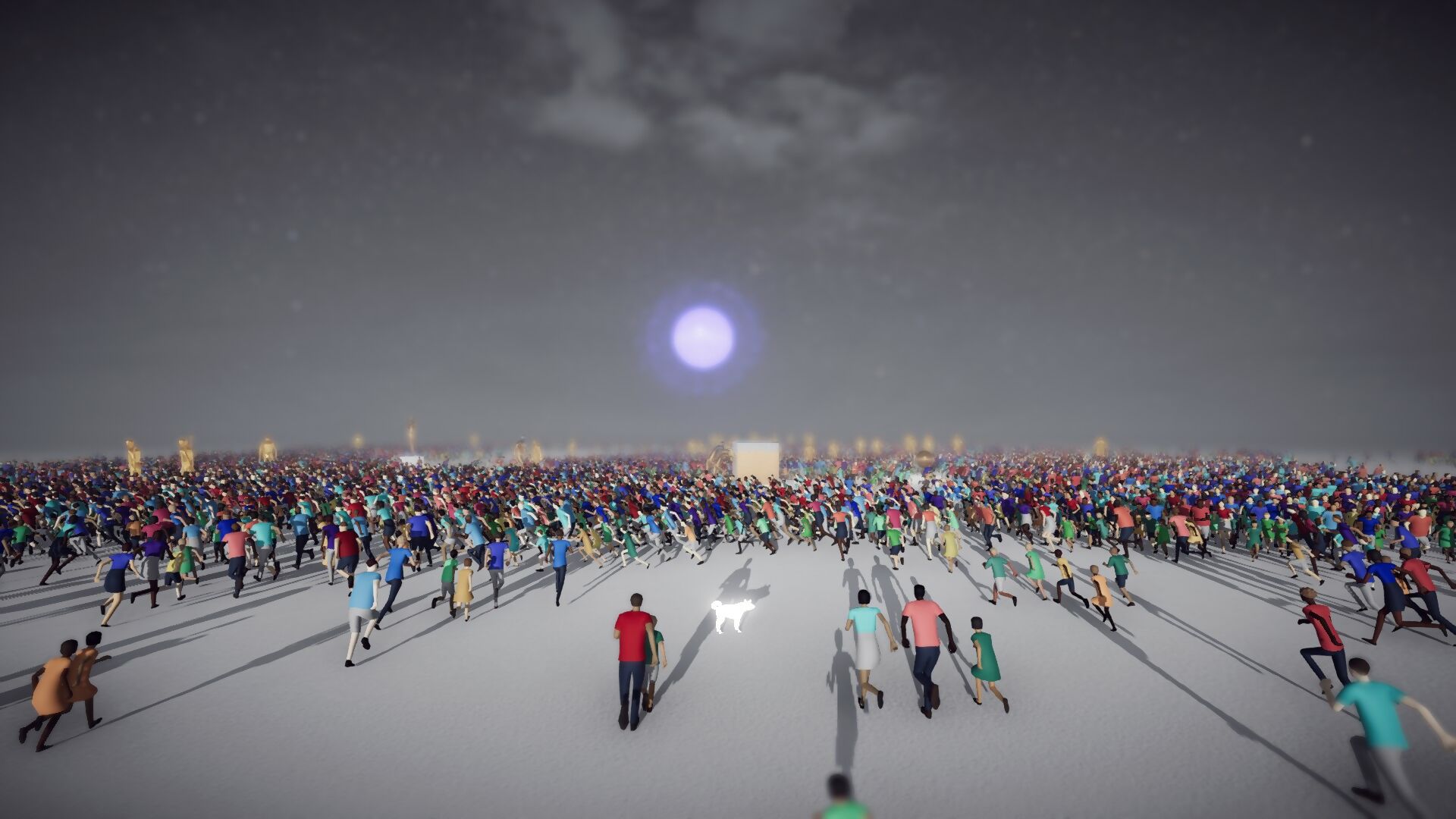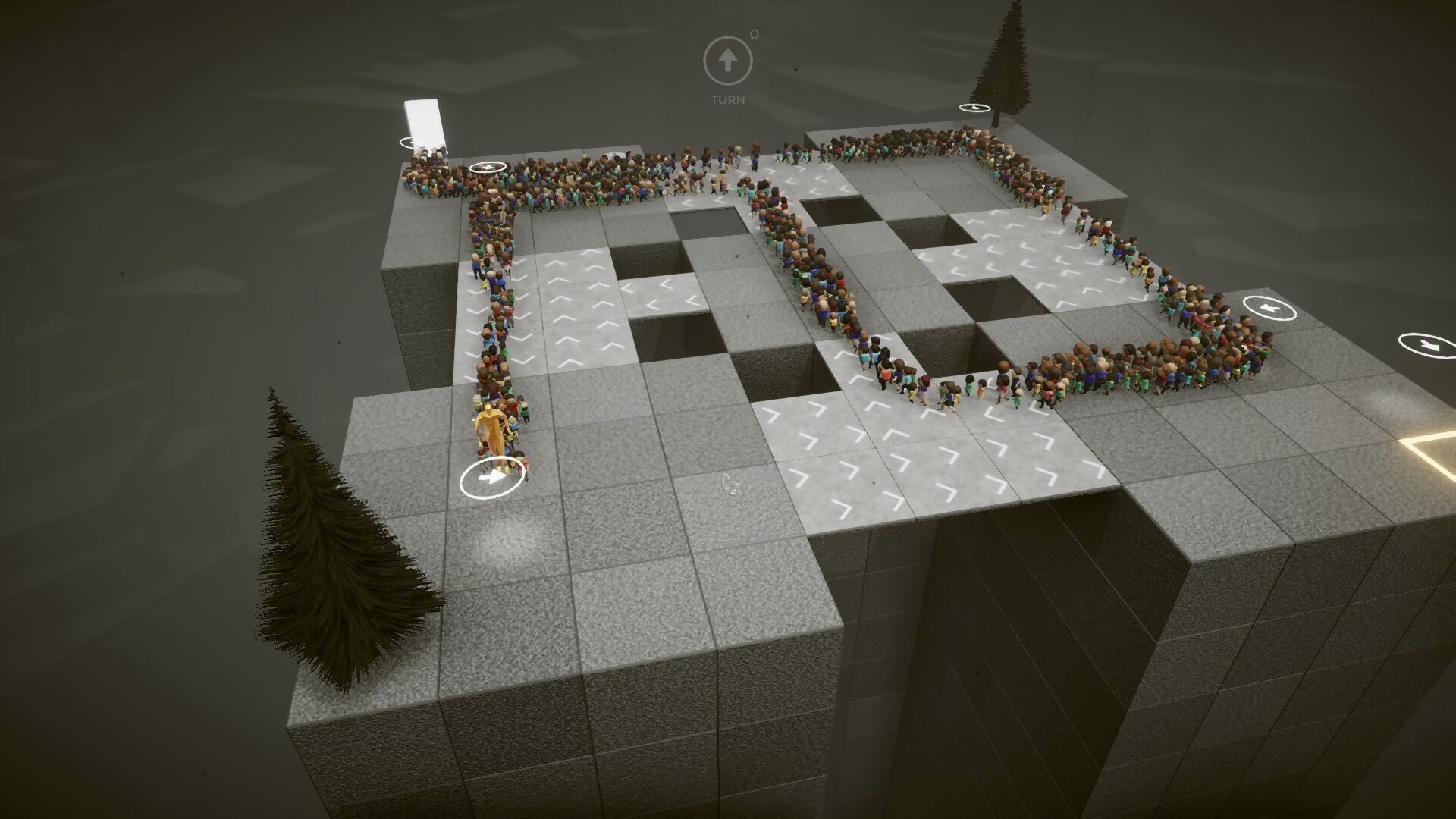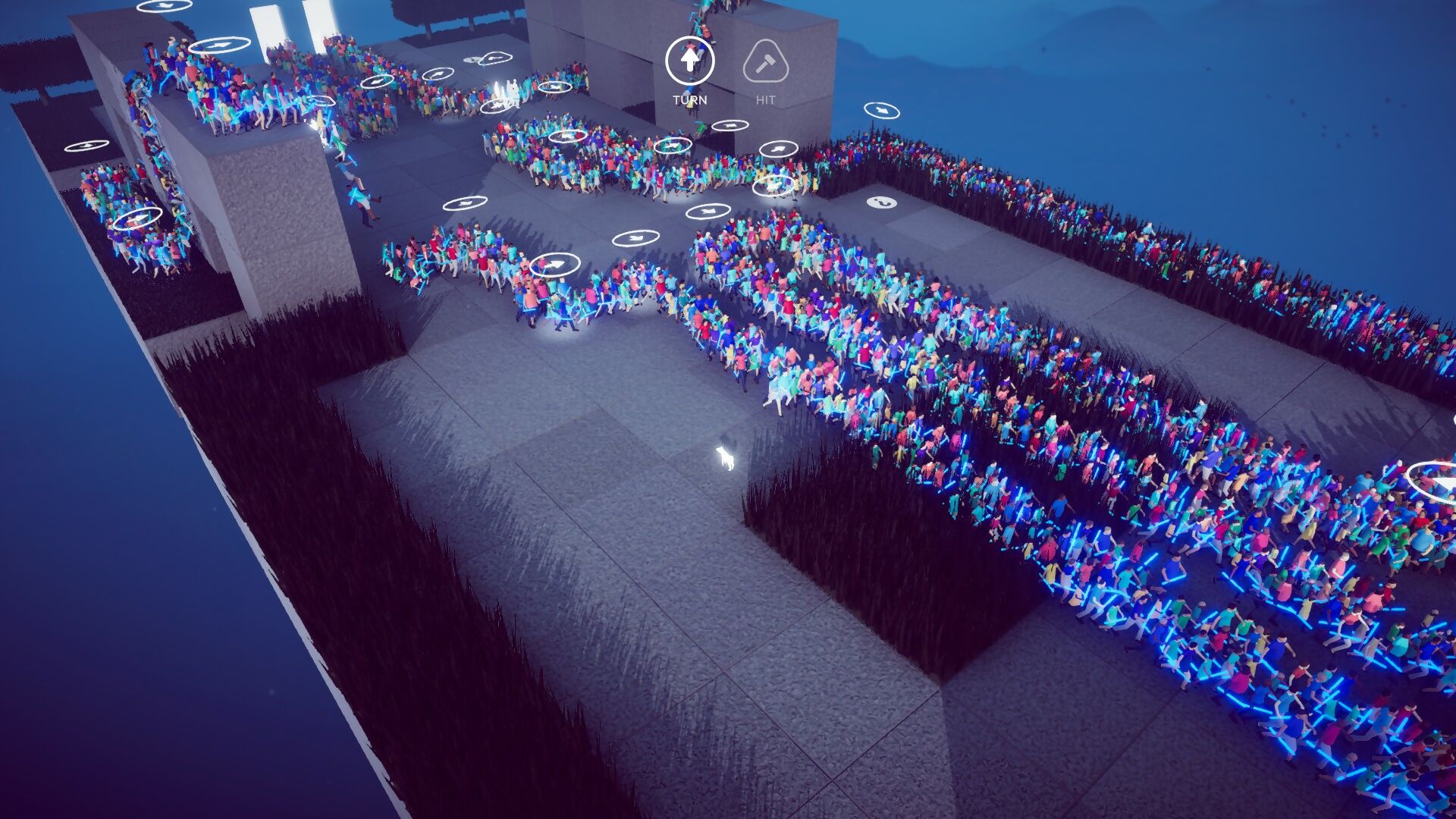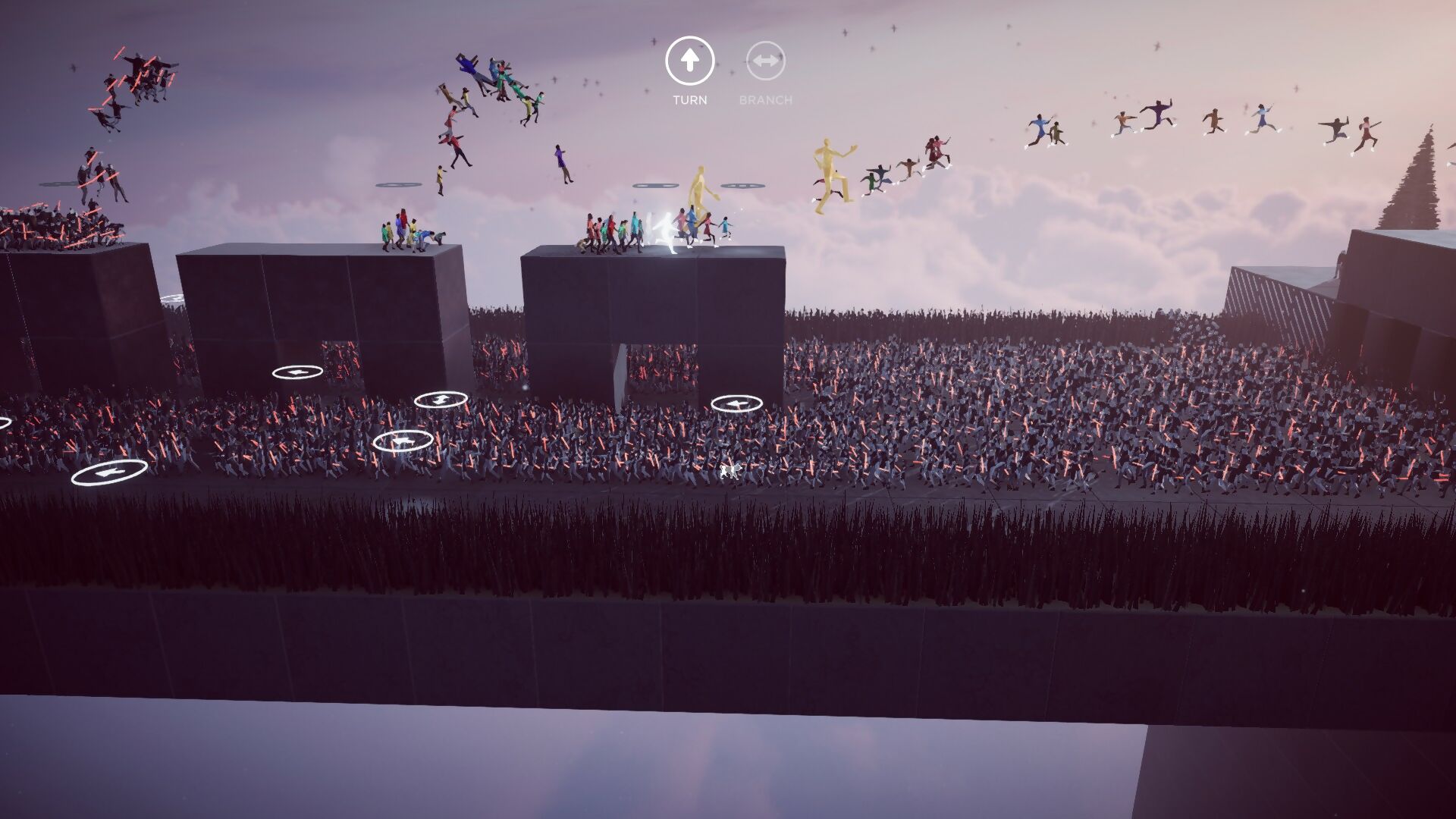
Humanity is a 3D puzzler with enthralling existential themes. Here’s our review of one of the year’s best games so far (yes, including Zelda…)
“I awoke one morning to find I was a dog.” The opening statement from the protagonist of Enhance’s puzzle game bears a striking resemblance to that of another story – Franz Kafka’s Metamorphosis, in which the unfortunate Gregor Samsa wakes up as a giant insect. It’s no idle comparison either, as Humanity thematically overlaps with Kafka’s tale of transformation, alienation, and the absurdity of existence. Although equally, of course, it’s a very different animal.
For one, there’s an initial whimsy about your task, using a white Shiba Inu to guide people towards ‘the light’ (the stage exit). The people, for their part, traipse in thick queues from portals in the game’s compact block and tile levels, milling forth until they pass over any commands you might lay in their path. With a sharp bark, your human herding hound can instruct the sleepy conga line to change direction, jump over gaps and obstacles, float to expand the range of their leaping, and more.
If you’re familiar with the old Amiga game Lemmings, you’ll get the basic idea here of constructing routes from commands to safely bring a string of bodies to its goal. But, to state the obvious, it’s not lemmings you’re dealing with here, it’s humanity, and that complicates matters. As you might expect from the studio that turned Tetris into a visual and musical journey through life, the universe and everything, Humanity isn’t merely a puzzle game, it’s an existential trip.

Credit: Enhance/THA Limited.
You should soon understand that adding humans to the mix brings heady chaos to otherwise clear solutions. You’re not laying track for a train here, you’re playing with living organisms that get harder to manage as their numbers increase. Make the line double back on itself, for example, and bodies clash, spilling over from the route you’ve dictated, sending individuals wandering off at unplanned tangents. Even when they hit a wall, they don’t stop, they slowly spread outward as the congregation builds behind them, until they push around the blockage and end up somewhere you didn’t want them to be.
What might be anathema to the rigid objects in other puzzle games, though, is all part of the process here. The crowd is a glorious improvised mess, always ready to fall into disarray, especially once Humanity introduces trigger switches, push blocks, fans that propel humans upwards and multiple streams of people coming from different directions. Now, careless adjustments in one place might disrupt others, until you’ve got bodies flowing off the edge of the play area into oblivion.
But hey, that’s humanity, right? When has progress ever been about neat plans, executed harmoniously, with predictable results? Dig into history and you’ll rarely encounter unequivocal brilliance. More like forward stumbles, learning from terrible experience, and happy accidents. Likewise in Humanity, completing levels is about coping with unforeseen complications and finding a way. You fail, you refine the route and the timing of your commands, failing better, until you fashion a form of success, often on the back of thousands of casualties.
In a way, it’s hard to know how to respond to the events that unfold. On one hand, Humanity offers a remote view of a species – the perspective of the economist, the sociologist, the warmonger – which blankets individuals under broad statistical strokes. On the other hand, you’re right there in the thick of it, making the statistics happen. “There is no document of civilization that is not at the same time a document of barbarism,” the philosopher Walter Benjamin wrote, reminding us of the skeletons in the cupboard of every great society. Humanity grasps that concept with both hands.
For example, while you craft a perfect path to keep one line of humans out of trouble, another may be dutifully chucking itself off the edge of the map like, well, lemmings, and it’s pure fortune which happens to get your attention first. Perhaps you feel pangs of sympathy. Or perhaps you rationalise those deaths as worthy sacrifices once both lines are walking in harmony. Or perhaps you don’t care. All common human reactions.
No doubt, it helps ease the conscience that success is often spectacular, quickly rewriting history to erase the horror that’s gone before. Humanity’s world may be sparse, cuboid, but as chains of people teem across it, the sheer numbers of little marching polygons are a wonder to behold. That wonder doubles when the camera circles the scene after a level is complete, letting you drink in the results of your pedestrian traffic flows – and reaches a peak when the view centres on a fan and float assisted jump, turning the procession into a living rainbow, infinitely bounding towards its goal. All the while, these stages hang above majestic Himalayan panoramas or city skylines, accompanied by mesmeric looping rhythms (while music in Humanity doesn’t evolve with your inputs as in Tetris Effect or Rez, it still melds with the visual swarm to produce euphoric moments – headphones are essential).

Credit: Enhance/THA Limited.
But as in civilisation, achievement, progress and our gradual metamorphosis lead to even greater barbarism. In time, Humanity introduces the Others, an opposing trudging faction that invariably gets in your way. The Others aren’t evil, they simply want to reach their own goal, but this is a zero-sum game where one side’s success comes at the cost of their rival’s failure. Humanity thus deconstructs the heroic narratives that cloak our efforts in so many games, abstracting conflict down to a core of clashing desires. There’s no final, absolute reason for you to beat them, only interests and ideologies. One of which, as the game’s mysterious trial-setter muses wryly, is the idea that competition brings out the best in people. Almost inevitably it’s a short hike from such thinking to not just avoiding the Others or racing them to a goal, but wiping them out in a genocidal arms race.
Even before this point, though, Humanity goes way past Lemmings, and starts to reveal true brilliance in flexing its systems to evolve alongside its subject matter. As in human history, certain universal traits carry from the earliest stages to the last, yet it’s also incredibly adaptable. In a chapter named Fate, for example, live management switches for a brand of puzzles in which you must plan out a route for the people before anything starts moving, then stand back and watch the consequences, hoping they meet your expectations. But throughout, Humanity slips between genres, transforming like poor Gregor, except far more smoothly and delightfully, working in snippets of platforming, stealth, tower defence, and 4x strategy. Indeed, this abstract vision arguably captures the madness, hubris, genius and circularity of our species more proficiently than the deepest simulation.
With these shifts, every new stage throws in an unexpected twist and makes you rethink what you know. Mirroring humanity’s endless quest for scientific knowledge, you fashion logical theories based on observable rules until the rules evolve, then you re-evaluate, experiment, recognising the shortcomings of wisdoms past to usher in the next incomplete paradigm. And remarkably, it’s impossible to pick out one style of puzzle from the concoction that works better or worse than the rest. They’re all satisfying to solve and execute. They’re all essential parts of the human experience.

Credit: Enhance/THA Limited.
As chapters morph in line with the enduring facets of our existence, however, from Fate to War to Dependence, one remains conspicuously absent – imagination. Yet that too is by design, as Humanity ultimately asks you to grab the baton and dive into its level creation and sharing suite, writing the future yourself. The developers have included some neatly quirky sample levels to kick things off here, but the legacy they leave is in your capacity for creativity and connectivity. Your mission is to take all the disparate pieces of Humanity and form them into as yet unimagined possibilities, or bond with ‘Others’ over the fruits of their creative labour.
It’s a hard challenge to resist, inspired by the creative lustre of Humanity itself. Like Tetris Effect before, Enhance’s latest feels utterly whole in its vision and its execution. Unlike the real humanity, it’s totally at ease with itself (and unlike The Metamorphosis, free from bugs). That sense of completeness goes right down to the decision to place a dog at the centre of the action – the ‘best friend’ who’s willing to make us face our flaws and contradictions as well as our strengths, so we might reach our potential. Hopefully, we can do Humanity justice. Woof.
Highlight
A secondary and often optional objective in each level is to collect Goldy, a giant gold man that all people apparently covet. And indeed, whether it represents money or God or something else, Goldy’s presence, standing tantalisingly off the main path, appeals to your own irrational desire for a sense of completion.





